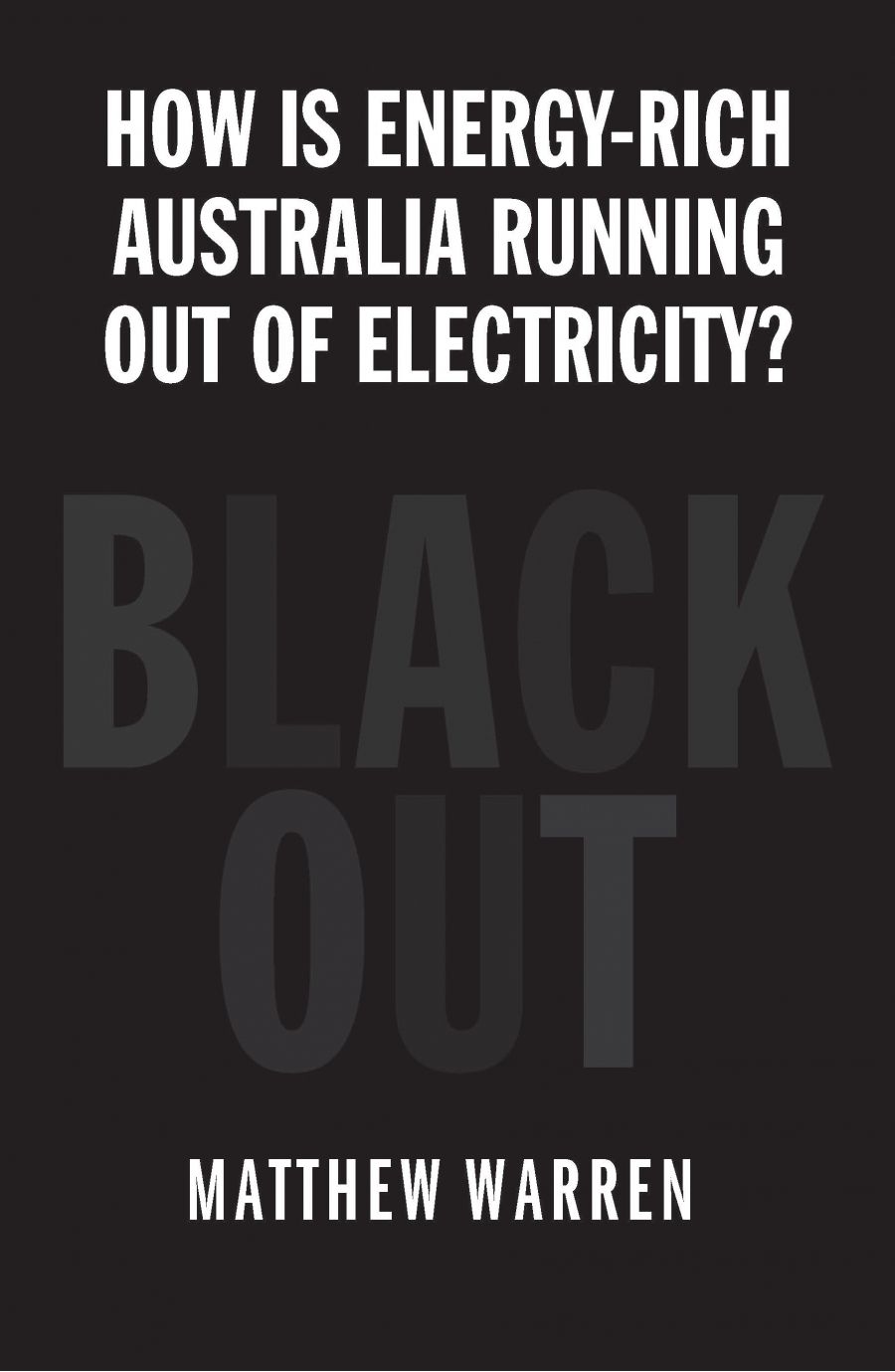
- Free Article: No
- Contents Category: Environmental Studies
- Custom Article Title: Kate Griffiths reviews <em>Blackout: How is energy-rich Australia running out of electricity?</em> by Matthew Warren
- Custom Highlight Text:
Australia’s energy transition has been hotly debated for a decade, and it doesn’t look set to cool anytime soon. Blackout: How is energy-rich Australia running out of electricity? offers readers the chance to be an informed participant in the debate. For more than a century, decisions about our electricity system have been left to the experts ...
- Book 1 Title: Blackout
- Book 1 Subtitle: How is energy-rich Australia running out of electricity?
- Book 1 Biblio: Affirm Press, $30 pb, 304 pp, 9781925870176
Fast forward to the twenty-first century: ‘My name is Australia and I have an electricity problem.’ Warren explains today’s electricity crisis clearly and engagingly. He elegantly traverses the design of the electricity market and the physical limits of the grid, without shying away from the technical nature of many of the issues. ‘At first I didn’t speak Electricity either,’ Warren says, ‘I had to learn it on the job.’
While Blackout gives a great overview of the history of Australia’s electricity system and the current challenges, it is weak on the future risks, particularly climate change. The book recaps the science behind climate change and the international and local political responses. But its discussion is limited to the risks of political intervention in the electricity market. There have certainly been many unhelpful interventions (and there will surely be more), but climate change poses physical, financial, and societal risks for the electricity system that deserve fuller recognition. Blasé lines like ‘so if we can’t save the planet, can we at least save the electricity system?’ revealingly miss the point.
Blackout is pitched at the ‘sensible centre’ and tries to explain things from a practical perspective. Those on Team Coal will find the role of coal in the history of Australia’s electricity system celebrated, but also a calm rational explanation of why its expiry date is looming. Those on Team Renewables have already backed the winning horse but may be surprised to learn that renewables targets and subsidies are not the best way to transition the energy system and are particularly unfair on low-income households.
After ‘a decade-long political tug of war over climate where the electricity system was the rope’, Warren argues for getting past the politics. It is a surprising argument coming from someone who has spent his career lobbying for first coal then renewables.
Politicians have much to answer for in creating and exacerbating Australia’s energy crisis. But who invited them into the fold in the first place? Industries vying for favouritism have encouraged government interventions – where it suits them. Meanwhile, consumers and taxpayers have been left to deal with the long-term consequences of their narrow, short-sighted interests. Blackout recounts some of these activities but misses the opportunity for sector reflection.
 Matthew Warren (photograph via Affirm Press)
Matthew Warren (photograph via Affirm Press)
Fortunately, Warren offers up an olive branch to help depoliticise the situation. Recognising that the experts closest to politicians and the media are often lobbying for something, Warren argues for an independent, expert body that can inform and respond to media and political concerns.
The Energy Security Board – born from the Finkel Review – could fill this gap. Warren proposes a range of new powers and responsibilities for the ESB. It is probably too broad a remit to be done well. But Warren is right that the sector needs to be more responsive to media and political interest to ensure that decision makers and the public at large are better informed.
Whether you are an energy enthusiast or perplexed by your power bill, Blackout offers a better understanding of the economic, physical, and political issues facing Australia’s electricity system. Australia’s transition to a clean-energy future is already well underway. What’s at stake is the pace and cost of the transition. None of the issues is insurmountable, but overcoming them will require a higher calibre of public debate.


Comments powered by CComment